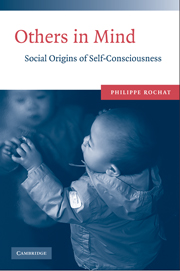Book contents
- Frontmatter
- Contents
- Foreword by Jerôme Bruner
- Preface
- Introduction: Main Ideas
- 1 Self-Conscious Species
- 2 Six Propositions
- 3 Varieties of Self-Reflective Mind State
- 4 Mind States in Development
- 5 Birth of Self-Consciousness
- 6 Shame and Self-Knowledge
- 7 The Roots of Guilt
- 8 Giving and Sharing
- 9 Origins of Owning and Sharing
- 10 Social Construction of Identity
- Conclusion: Moral Space and the Self
- Postscript Note
- References
- Index
9 - Origins of Owning and Sharing
Published online by Cambridge University Press: 05 August 2012
- Frontmatter
- Contents
- Foreword by Jerôme Bruner
- Preface
- Introduction: Main Ideas
- 1 Self-Conscious Species
- 2 Six Propositions
- 3 Varieties of Self-Reflective Mind State
- 4 Mind States in Development
- 5 Birth of Self-Consciousness
- 6 Shame and Self-Knowledge
- 7 The Roots of Guilt
- 8 Giving and Sharing
- 9 Origins of Owning and Sharing
- 10 Social Construction of Identity
- Conclusion: Moral Space and the Self
- Postscript Note
- References
- Index
Summary
“Mine!”
A child, twenty-one monthsHumans evolved to become Homo negotiatus, a species in which social behavior revolves primarily around the tallying of exchanges, the co-construction and constant reassessment of shared values. We spend our time assessing and adjusting our consensus about the values of things with other people. But more importantly, once again, we are constantly gauging the degree of our affiliation with others, our social proximity and social impact on others, fighting off the basic fear of rejection.
Children grow to become such creatures, deeply immersed in the negotiation of values about things, including the value of the self in relation to others. This chapter is concerned with how children come to give and share in reciprocal exchanges, in what psychological context they become concerned about others by either sympathizing or empathizing with them.
First, I consider the human sense of ownership and entitlement as a necessary condition. I ask, Where does the sense of ownership come from? What are the first manifestations of an apparent sense of entitlement in the child, and how does it come about? I then turn to the developmental emergence of empathy as opposed to sympathy toward others, active sharing and negotiation, ultimately questioning what might lead children to relinquish property with others in mind.
FIRST CLAIM OF OWNERSHIP
Unmistakable first signs of possessiveness are expressed early on in relation to the mother or any primary caretakers, anybody who is familiar to the young child.
- Type
- Chapter
- Information
- Others in MindSocial Origins of Self-Consciousness, pp. 155 - 190Publisher: Cambridge University PressPrint publication year: 2009



